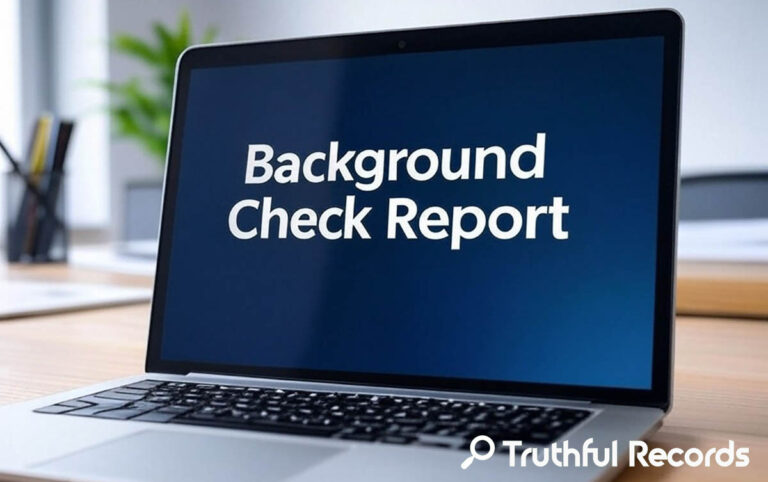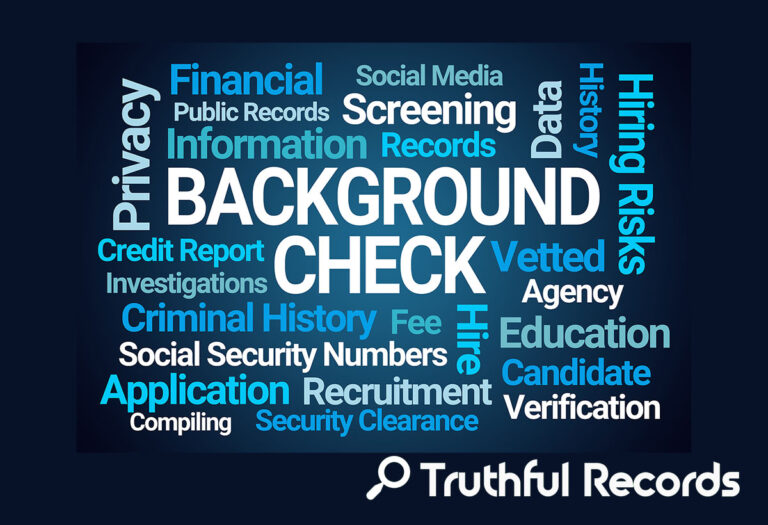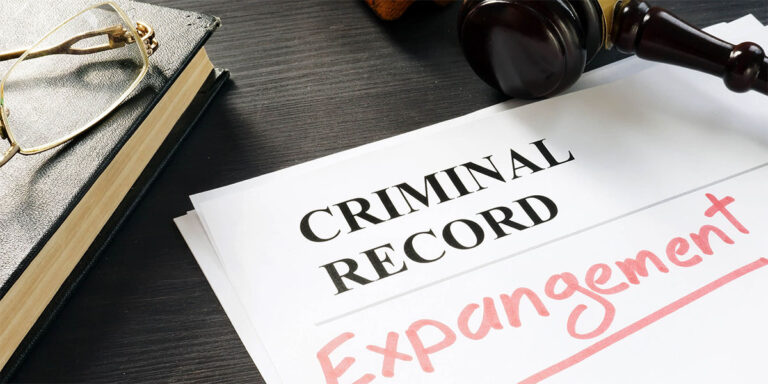Background Check Requirements: Everything You Need to Know
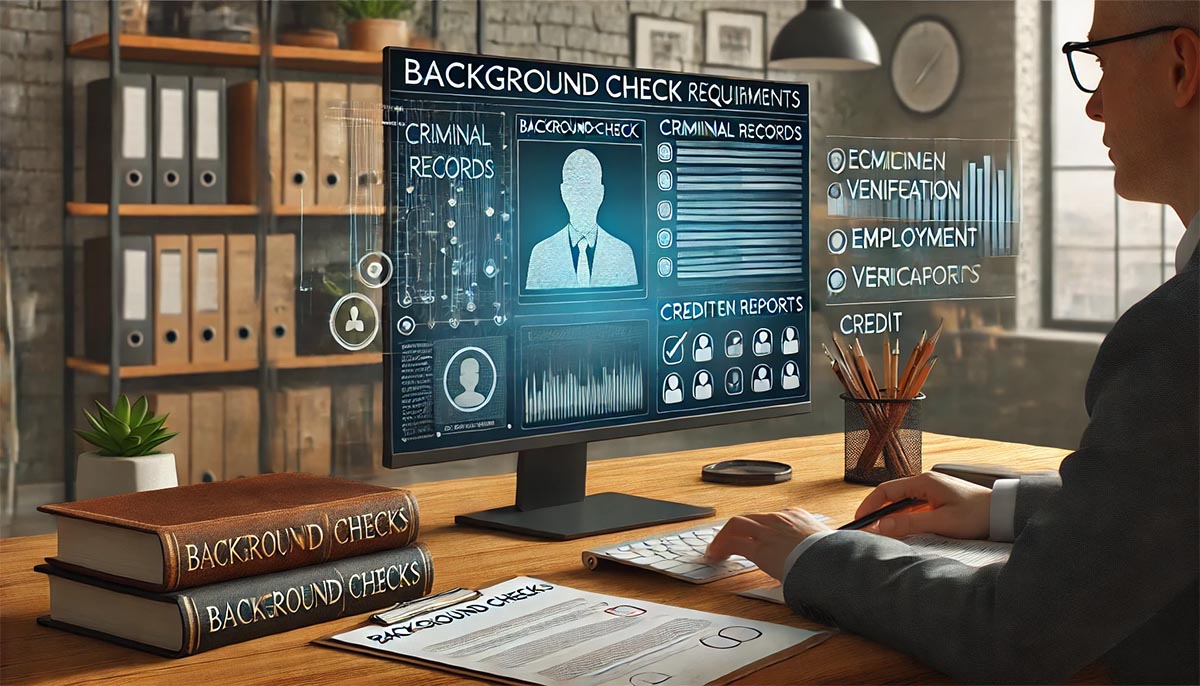
Are you wondering what background check requirements you need to know about in 2025? Whether you’re hiring someone for a job, renting out a property, or just curious, it’s important to understand how background checks work.
Background checks help you confirm someone’s history and make sure everything is safe.
In this article, we’ll explain the different types of checks, what they look for, and why they matter.
If you want to learn more about personal background checks, check out this guide here.
What Are Background Check Requirements?

When you’re hiring someone, renting a property, or just doing business, background checks are really important. But what do these checks actually look for? Let’s make it simple.
Definition and Importance
A background check is a way to confirm someone’s past. It helps employers, landlords, and other people learn about a person to make sure they’re making the right choice. For example, imagine hiring someone for a job without knowing if they actually have the skills or experience they say they do – that could cause big problems!
Background checks help you confirm things like criminal records, past jobs, and even credit scores. They help you make safer, smarter decisions.
These checks are super important, especially when you’re hiring someone or deciding if someone is a good fit for renting a place. They help you avoid risks, like hiring someone who’s not honest or renting to someone who doesn’t pay their bills. Without background checks, you could be putting yourself and others at risk. They’re a must!
Common Scenarios That Require Background Checks
You might be thinking, “Okay, when do I actually need a background check?” Let’s look at a few situations where they’re needed.
Employment Checks
If you’re hiring someone, you want to be sure they have the right experience, skills, and a clean record. You don’t want to hire someone who lied about their past or, worse, has caused trouble at work. A background check will help you check things like criminal records and work history. This can save you a lot of trouble later and keeps the workplace safe for everyone!
Tenant Screening
If you’re renting out a property, you need to know who you’re renting to. Tenant screening is where background checks come in. Checking things like criminal history, rental records, and even credit scores helps you find responsible tenants. You don’t want someone who has been evicted multiple times or has trouble paying rent. A thorough background check helps you find trustworthy renters.
Criminal Background Checks
One of the most common reasons for a background check is to look for any criminal history. If you’re hiring or renting to someone, knowing if they have a criminal record is key. You need to feel safe and comfortable. A criminal background check can show you past convictions or pending charges. This way, you can make an informed decision. It’s all about protecting yourself and your community.
Background checks are all about making smarter choices! Whether you’re hiring someone, renting out a property, or doing business, they help you feel more confident.
Types of Background Checks and Their Requirements
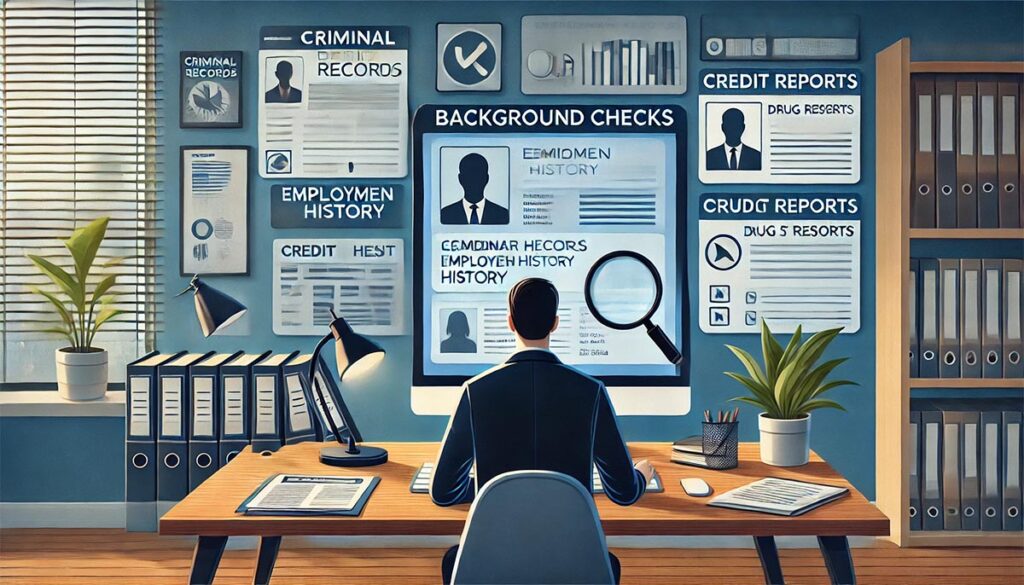
Background checks come in all shapes and sizes! They’re done for different reasons and each one looks at different parts of a person’s history. Let’s look at the most common ones and what they check for.
Criminal Background Checks
When we talk about background checks, criminal checks are often the first thing that comes up. These checks help find out if someone has a criminal history.
So, what do these checks actually look for? They search for things like arrests, convictions, and sometimes even charges that are still being investigated. This helps you see if there’s anything risky in someone’s past.
There are two main types of criminal checks: state and federal. A state check looks at records from one specific state. A federal check looks at records across the whole country. Depending on what you need, you might run one or both to get the full picture.
Employment Background Checks
Before hiring someone, you want to know who you’re really bringing onto your team, right? That’s where employment background checks come in.
These checks make sure the person has the right work experience. They’ll verify things like the jobs they’ve had in the past and the positions they’ve held. Did they really work at the places they say they did?
But it doesn’t stop there! Employment background checks also include education and credential checks. You’ll want to verify that they actually have the degrees or certifications they say they do. This can help you avoid hiring someone who isn’t qualified for the job.
Credit Checks
Credit checks are usually done when someone is applying for a job or renting a property.
So, when are credit checks required? They are often needed for jobs that involve handling money or for renting a home. Credit checks give you a look at how someone handles their money and if they have any unpaid bills.
A credit check can affect hiring or renting decisions. If someone has a poor credit history, it might be a red flag—especially for jobs involving money. However, it’s important to remember that credit checks are just one part of the bigger picture.
Drug Testing Requirements
Drug testing is also a part of some background checks. Employers and landlords sometimes require drug tests to make sure a person is sober and responsible.
So, how does drug testing work? It usually involves a test of urine or saliva to check for drug use. It’s pretty straightforward, but the legal rules can get tricky. The laws about drug testing can be different depending on where you live. Some places won’t allow drug testing unless it’s required for the job.
While drug testing is common, it’s important to know the rules in your area. It’s all about following the law and making sure you make the right decisions.
These are the main types of background checks, and they each play a big part in keeping things safe and secure. Whether you’re hiring someone, renting out a place, or just doing business, knowing what each check looks for helps you make better choices.
Legal Considerations and Regulations
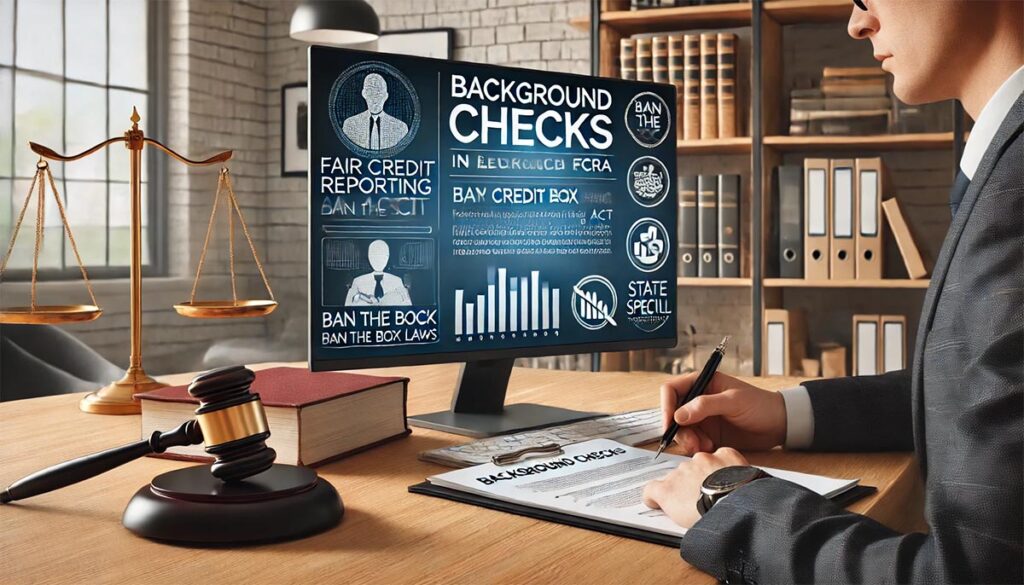
When it comes to background checks, there are laws that make sure everything is done fairly and legally. It’s important to understand these rules so you’re following the law and treating people right. Let’s dive into some of the key legal aspects of background checks!
Fair Credit Reporting Act (FCRA)
The Fair Credit Reporting Act (FCRA) is a law that helps protect people’s privacy when it comes to background checks. It sets rules for how background checks should be done and what kind of information can be shared.
Under the FCRA, employers and landlords must get permission before running a background check. They also have to notify someone if they decide not to hire them or rent to them based on the results of the check.
Employers and landlords need to make sure they are following the FCRA by:
- Getting written consent before running a background check.
- Providing a notice if they decide not to take an action based on the check (like not hiring someone).
- Allowing the person to see the information that was used to make the decision.
It’s all about making sure the process is fair and transparent!
Ban the Box Laws
Have you ever seen a job application that asks if you’ve ever been convicted of a crime? Well, Ban the Box laws are here to change that! These laws stop employers from asking about criminal history too early in the job application process.
The idea behind “Ban the Box” is simple: It gives people a chance to get their foot in the door without being judged right away for a past mistake. This way, employers focus on a person’s skills and experience first, not just their criminal record.
In many places, it’s now illegal for employers to ask about criminal history until later in the hiring process. This helps create a fairer chance for everyone.
State-Specific Laws and Restrictions
Did you know that different states have different rules for background checks? Yep, it’s true! Each state has its own laws about what can and can’t be included in a background check.
Some states have laws that limit how far back an employer can check someone’s criminal record. Others might have rules about when and how credit checks can be done.
A few states even have special laws protecting people with certain criminal convictions from being automatically disqualified for certain jobs.
It’s important to know what the rules are in your state before running background checks. Some of the key states with unique laws include California, New York, and Massachusetts. They have some of the strictest regulations when it comes to background checks.
So, make sure you check your state’s laws to stay compliant and avoid any legal trouble!
Understanding these legal aspects of background checks is super important. By following the rules, you make sure the process is fair for everyone and avoid any potential problems down the road.
How to Ensure Compliance with Background Check Requirements
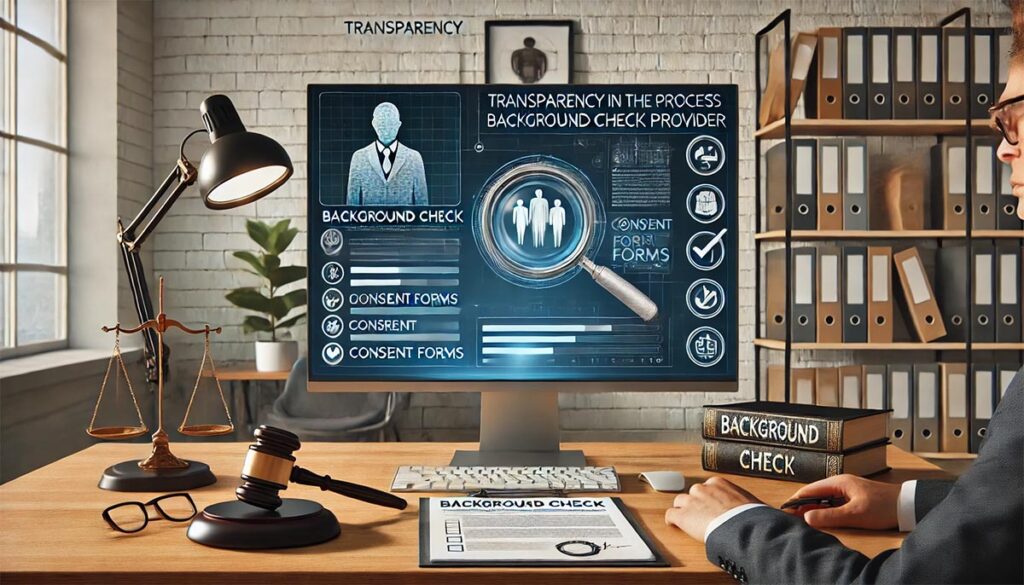
When you’re running background checks, it’s crucial to follow the rules and make sure everything is fair. If you’re not careful, you could run into legal issues or even lose trust. Here’s how to make sure you’re staying compliant with background check requirements!
Informing Applicants and Tenants
Transparency is key when it comes to background checks! Whether you’re hiring someone for a job or renting out a property, it’s important to be clear about the process from the start.
First things first, you need to let the person know that you’ll be running a background check. They must give their consent, which means they should agree to it in writing. This is not just a nice thing to do – it’s the law!
By informing applicants and tenants upfront, you make sure they know what to expect. It also builds trust, so they won’t be caught off guard when the check happens.
How to Choose a Reliable Background Check Provider
Not all background check companies are the same. When choosing one, you want to make sure you’re picking a reliable and trustworthy provider.
Look for a company that’s well-known and has a good reputation. A solid background check provider will give you accurate, up-to-date information. You should also check if they comply with the Fair Credit Reporting Act (FCRA) and other relevant laws.
When looking at the reports, make sure they’re clear and easy to read. You want all the details, but you don’t want it to be a confusing mess! Reliable providers will give you the information you need in a simple format.
Avoiding Discriminatory Practices
Fair treatment should be at the heart of everything you do. Whether you’re hiring or renting, it’s essential to make sure you’re not discriminating against anyone based on things like race, gender, or disability.
To avoid discrimination, make sure your background check process is fair and consistent. Treat all applicants equally and only use background check results that are directly related to the job or rental situation.
Remember, discrimination isn’t just wrong – it’s illegal! It’s also important to stay updated on laws in your area that prevent discrimination in hiring and renting. By being fair and following the rules, you create a better and safer environment for everyone.
These steps will help you ensure that you’re running background checks the right way! By being transparent, choosing a reliable provider, and avoiding discrimination, you’ll be on the right track to compliance.
The Future of Background Check Requirements

As technology continues to evolve, so does the background check industry. In the near future, we can expect big changes that will make the process faster, more accurate, and even more accessible. Let’s look at how things are changing and what trends to expect in 2025!
Evolving Technology and Automation
AI and automation are playing a huge role in the future of background checks! In the past, these checks were mostly done manually, which meant a lot of time and effort. But now, technology is stepping in to make things quicker and more efficient.
AI can help speed up the process by scanning huge amounts of data quickly and accurately. This means faster results, fewer errors, and less waiting around. Automation helps too, by handling tasks like data entry and tracking progress, leaving humans to focus on more important things.
While this tech is exciting, it comes with its challenges. As we rely more on automation, we need to make sure that AI is making fair and accurate decisions. Plus, some people might worry about their personal data being handled by machines. But overall, AI and automation are making background checks more efficient and streamlined.
Trends to Watch in 2025
So, what’s next for background checks? Here are some predictions on what we might see in 2025 and beyond.
First, we’re likely to see more states and companies adopting automated background check systems. This will make the process faster and more standardized across the board.
We may also see a bigger focus on digital identity verification. As more services move online, verifying someone’s identity through digital means will become even more common. This could include things like biometric scanning or other advanced methods.
Another trend is the continued rise of instant background checks. With technology improving, more companies will be able to run background checks in real-time, giving quicker results for everything from hiring to renting.
Finally, we might see new laws and regulations come into play to keep up with these changes. As AI and automation become more involved, lawmakers will need to ensure that people’s privacy and rights are still being respected.
The future of background checks is looking pretty exciting! As technology evolves, so will the way we conduct these checks. Stay tuned for more updates on how the industry will change in 2025 and beyond!
Conclusion
To sum it up, background check requirements are really important when making decisions about hiring, renting, and more. Whether it’s checking someone’s criminal history or credit report, it’s key to know which checks are needed and how to follow the rules.
If you need to run background checks, make sure you’re staying updated on the latest laws and best practices. By understanding the process and knowing the rules, you can make smart and confident choices!


